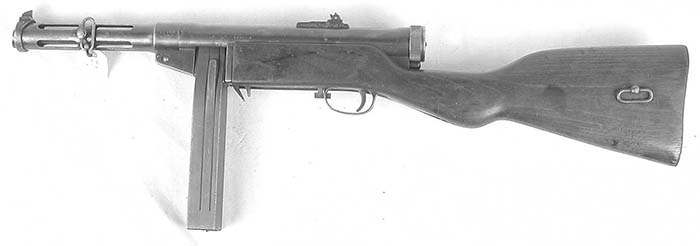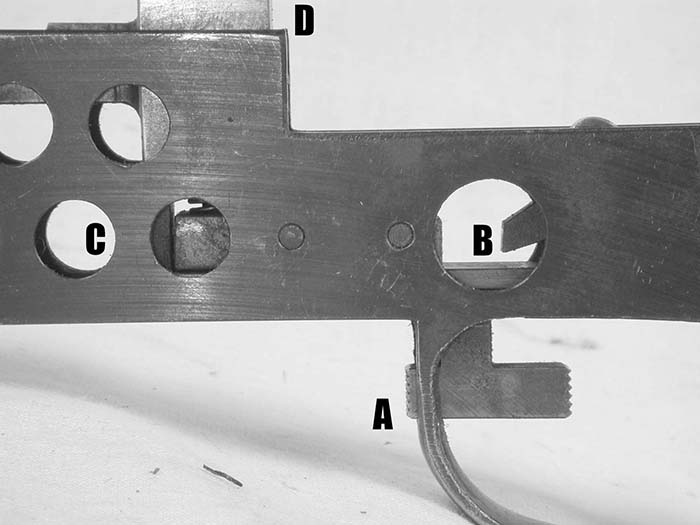By Dan Shea
Q-Regarding the Suomi M31, I have studied the trigger mechanism, and it has a full auto, a semi auto and a safety position. Safe blocks the trigger from moving and Full Auto raises and lowers the sear as the trigger is pulled. That makes sense, but the Semi Auto sequence has me confused. In this mode, the whole sear is initially pulled down and then is released upwards. I do not see how this reengages the rear safety sear. A detailed sequence of firing description, or pictorial might be very interesting to me, and some readers unfamiliar with the working of the Suomi.

Photo by Dan Shea, Courtesy LMOLLC Working Reference Collection.
A- The Suomi submachine gun is a very reliable design, and quite desirable for collectors and shooters in the United States. John Ross was well known for shooting trap with a Swedish M37/39 and 9mm instant light tracer at Knob Creek, which showed just how controllable a submachine gun the Suomi design is.
The Suomi design utilizes an early form of disconnector in the semi auto mode, and it sounds like you are looking at a trigger pack and trying to figure out how it works – because outside of the system, it doesn’t. There are other factors that you need to see in order to make the Suomi disconnector seem sensible. A photo sequence is probably the best way to illustrate this.








Q-A long time ago, I bought a parts set from you for the Beretta M57 submachine gun. I have been waiting a long time for a write up in SAR, but can you at least give us some information on the magazine in the system? The one I got appears to have been “made up.”


A- That was a long time ago. And, yes, the magazine we had with the kits was “made up.” The Beretta Model 57 submachine gun was a cross between an M2 Carbine and a Beretta dual trigger submachine gun. While the M57 is outwardly very much like an M1 Carbine, and many people bought those kits because they collected M1 series guns and thought this to be the ultimate oddity, it is most decidedly not an M1 variant. I plan a feature on this system at some future point, but a bit of information might help. While also similar to and often mistaken for the San Cristobal carbine, the M57 is even rarer than that. We had only been able to track manufacturing of about a thousand of the M57s, and LMO obtained 135 parts sets from North Africa back in the late 1980s. Unfortunately, when they came in, the magazines that came with them were for the San Cristobal Carbine and did not go with these kits at all. Master Gunsmith Stan Andrewski made enough magazines out of M1 Carbine mags so that each kit could have a magazine, but these were obviously not original to the weapon.
The Beretta M57 submachine gun utilizes a dual column, dual presentation, straight bodied, steel magazine. Caliber is .30 Carbine. These are similar to the San Cristobal Carbine or US M1 Carbine magazines, but not interchangeable.
Q-Are there any Australian F1 submachine guns in the United States?- email
A- I would have to assume you are asking if there are any fully transferable or dealer sample F1s in the US, and would have to say that I have never seen one. I spoke with a few other long time dealers and collectors, and they had not run across one either. There are a few in the government museum collections. This odd submachine gun appears to be a cross between a Sterling and an Owen, but is in a class by itself. The top mounted magazine allows for getting close to cover when firing, and it is internally similar to the Sterling. These were all made at the Small Arms Factory in Lithgow, New South Wales, Australia, and the production started with the X3 submachine gun and continued through the Mid 1960s as the F1. These were used by the Aussie troops in Vietnam, so it is very possible that an American GI brought one home and registered it in the 1968 Amnesty. If anyone has any information on these in the US, it would be appreciated by SAR’s readers, so please send it in.

Q- A friend said he had a “Stinger” 22 and that it didn’t need registration. It was clearly a pen gun, and not one of the fold down Stinger pistols that have been legally sold as handguns. Any truth to that?
A- Hard to tell without a photo from you. I suspect you are referring to the “Clandestine Weapon, 22sht”, more commonly referred to as the “OSS Stinger”. This was designed in 1943, and only a few thousand of these single shot, non-reloadable, throw-away weapons were made. Once fired, they are not considered a firearm. If it is still loaded, it is considered an Any Other Weapon, requiring registration with NFA Branch of ATF. In other words, if it is live and it isn’t registered, it is contraband. Expended (fired), it is nothing but a curiosity. Here is a photo comparing the OSS Stinger to the MAC Stinger, which was a 1960s design that was reloadable. These MAC Stingers are all considered to be Any Other Weapons requiring registration and transfers under the National Firearms Act.

Q-I have a friend who says the Russians are using Miniguns on their helicopters, and I wonder if the US is supplying these, or are they making Miniguns in Russia now?
A- The US manufacturer is not supplying M134 Miniguns to the Russians. They have their own design and have had it for some time. It is called the YAK-B, and it is very different from the US Minigun. The YAK-B is a four barreled gun, usually in 12.7x109mm (same as the DShk38/46 ammunition) and sometimes it is offered in 7.62x54R, although I have never seen one in this caliber, anywhere. The beauty of the Russian design is that contrary to the complex receiver made for the US M134, the YAK-B is simply a length of tube that has bolt in cam paths that can be changed if worn. This greatly simplifies manufacture and rebuild, and the bolts have large, effective rollers on them. Inside the barrels is an energy storing spring, and there are blank firing cartridges that can be fired to get a stopped gun moving again. SAR is planning a feature on the YAK-B system, but here is a picture of the 12.7 YAK-B next to a 7.62x51mm M134 Minigun system, which is the US Minigun you are referring to.

Send questions to: Raffica
sareview@aol.com
Or mail to Small Arms Review Attn Raffica
631 N. Stephanie St #562
Henderson, NV 89014
| This article first appeared in Small Arms Review V9N1 (October 2005) |











